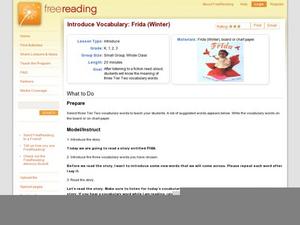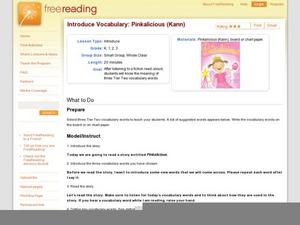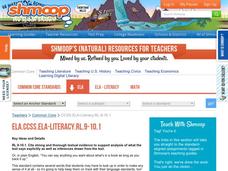Curated OER
Homophones and Homographs
Getting tired of correcting to, two, and too? What about weather and whether? Use a thorough lesson on homophones and homographs to clear up those differences. Fourth and fifth graders identify which words sound the same and are spelled...
Curated OER
Being Forceful
Young scientists consider the forces of push and pull, start and stop, and try to categorize each one correctly. There are five cartoon drawings of kids performing an activity. Learners must write push or pull, and start or stop in the...
Curated OER
For a Change
Here is a worksheet that has young scientists think about things that been changed as a result of heating and cooling, and if they can be returned to their original form. There are seven scenarios to consider, and they must choose,...
Curated OER
Introduce Vocabulary: Alexander, Who Use to be Rich Last Sunday (Viorst)
Although this vocabulary-in-context activity is focused on Judith Viorst's book Alexander, Who Use to Be Rich Last Sunday, the strategy can be applied to any book budding learners read with you. First, introduce the three new words you...
Curated OER
Introduce Vocabulary: Clifford the Big Red Dog (Bridwell)
Clifford the Big Red Dog is here to introduce some new vocabulary terms in context to young readers. Although this activity is designed around Norman Bridwell's picture book, the strategies are applicable for any text. Introduce the new...
Curated OER
Introduce Vocabulary: Clouds (Bauer)
What type of cloud is that? Explore meteorological vocabulary using Marion Bauer's book, Clouds (although these strategies could be used for any fiction or nonfiction text). Pre-teach the new words before reading the story aloud....
Curated OER
Introduce Vocabulary: Countdown to Kindergarten (McGhee)
Budding readers will relate to Allison McGhee's story Countdown to Kindergarten in which a young girl is worried about not being able to tie her shoes once she gets to school. This is a fun way to teach vocabulary in context, although...
Curated OER
Introduce Vocabulary: Dinosaur Bones (Barner)
Dig into some prehistoric vocabulary in Bob Barner's informative book Dinosaur Bones. This works best if you introduce the primitive words before reading the story. These are the focus terms in the text: ancient, climate, extinct,...
Curated OER
Introduce Vocabulary: Frida (Winter)
Combine vocabulary in context with art history using Jonah Winter's colorful biography Frida. Although there are quite a few words you could teach from this text, four are listed here with connecting questions: ill, imitate,...
Curated OER
Introduce Vocabulary: Make Way for Ducklings (McCloskey)
Use the Caldecott Award-winning book Make Way for Ducklings by Robert McCloskey (which can be found on YouTube if you don't have it) to guide budding readers through vocabulary in context. Although the instruction here is limited to the...
Curated OER
Introduce Vocabulary: Moonbear's Bargain (Asch)
If you are reading Frank Asch's book Moonbear's Bargain, here is an excellent way to practice vocabulary in context with budding readers. Although you could include others, the recommended words for this text are: blossom,...
Curated OER
Introduce Vocabulary: Night Shift Daddy (Spinelli)
Do any of your budding readers have parents who work the night shift? Eileen Spinelli's book Night Shift Daddy, which can be found on YouTube if you don't have it, examines this family dynamic in a positive light and is an excellent...
Curated OER
Introduce Vocabulary: Pinkalicious (Kann)
Although the title of Elizabeth Kann's story Pinkalicious isn't a real word, the book is an excellent way to explore some new vocabulary in context: acute, mushy, rare, steady, and surrounded. Find the story free on YouTube if you don't...
Worksheet Web
Interrogatives and Auxiliary Verbs
Interrogatives—who, what, where, when, why, and how—are the focus of a grammar worksheet that reinforces writing questions and using auxiliary verbs.
Curated OER
The Verb
How are linking verbs and action verbs different? First, study the definitions and examples of each (at the top of the first page). Then, assess the comprehension skills of your class by having them complete the 20-question practice...
Utah Education Network (UEN)
Greek and Latin Roots- Introduction
Improve vocabulary by reviewing Greek and Latin roots with your ELA class! A fun and easy way for your class to memorize roots, groups are given a set of nine roots and nine definition cards which they must then match. Encourage groups...
Curated OER
Minutes and Days
Elapsed time is a skill developed by the single question that is the center of this activity. Fifth graders are asked to find out the time that is 2011 minutes after the beginning of 2011. This question addresses the standard that...
Shmoop
ELA.CCSS.ELA-Literacy.RL.9-10.1
Does your ELA class need some practice with the specific skills outlined in the Common Core standards? Then this is the perfect resource for you! One in a series of connected lessons that cover the standards for reading literature,...
Using English
Emailing Functions Correction and Brainstorming
How do you address a large group of people? How would give someone bad news? How would you share happy news with a friend? Help your intermediate English language classes form these sentiments by providing them with this practice...
Yummy Math
Steep Hikes
Grab your hiking gear and get ready for a math adventure! Learners explore the meaning of percent grade change, as compared to the slope in an excellent worksheet activity about hiking trails in the mountains of New Hampshire. They use...
Students Against Depression
Understand Your Depression
What are the warning signs of depression? What contributes to and maintains this disorder? Learners answer several short-answer questions regarding depression using a well-designed student packet. The lesson concludes by considering the...
1 plus 1 plus 1 equals 1
I Can Read! Sight Words Set #3
Practice sight words with an array of fun activities. Kids focus on like, is, my, and it with bingo games, connecting the dots, and tracing activities.
1 plus 1 plus 1 equals 1
I Can Read! Sight Words Set #14
Study the sight words but, have, will, and into with a series of reading activities. With tracing lessons, matching games, and flash cards, the packet is a great first step to a successful reading education.
E Reading Worksheets
Tone Worksheet 4
A poet's word choice can be the difference between a poem that is merely sad, and a poem full of heartbreaking regret. Middle schoolers discern the tone in four different poems, noting the relevant textual evidence that supports each...

























